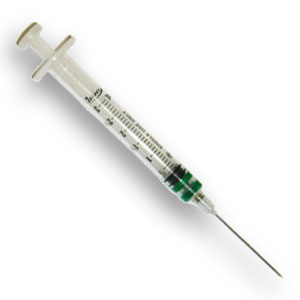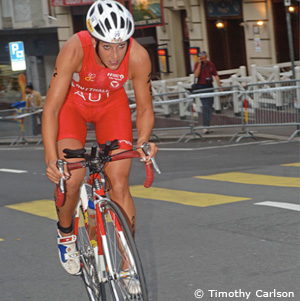ITU starts Athlete Biological Passport testing
The International Triathlon Union announced today that it has begun an Athlete Biological Passport program designed to reveal doping indirectly by tracking selected biological variables that would indicate blood doping or other illegal forms of increasing red blood cell count to enhance performance.
The ITU Passport program will follow World Anti-Doping Association protocols established in 2008 which have been pioneered by the UCI and Tour de France cyclists since 2009.
“We started using the passport program in Des Moines before the Hy-Vee Triathlon and will target anyone among the 140 athletes within the Olympic qualification standard,” said Loreen Barnett, Executive Director of the ITU. “All athletes who fall within the registered testing pool will be tested between three and five times per year. They will be tested before competition, in-competition and in unannounced out of competition tests to ensure that their biological markers and thresholds fall within their established norms. When tested markers hit unusual levels outside of their established norms, that will trigger additional tests and continual monitoring of those results.”
Barnett said that the ITU will be investing a sum “approaching $250,000 a year“ for the passport program.
“Investing is the right word,” said Barnett. “It is an investment to keep our sport clean.”
Barnett said that the focus of the passport program was to “target blood doping as opposed to steroids or other forms or substances which attempt to modify the natural processes of producing red blood cells. We will continue to carry on other forms of traditional testing.”
Jessica Harrison, one of two current ITU athletes’ representatives, enthusiastically endorsed the initiative.
“It's a really pro-active and bold step from the ITU and one which the athletes (through their committee of which I'm a spokesperson) have actually been pushing for,” Harrison wrote in an email. “We (the athletes committee) had a meeting with WADA and the ITU at the London WCS last year and one of the things that we said was that we'd like to see this kind of thing in our sport as soon as possible.”
Harrison said that she and the ITU athletes want to maintain and preserve the ITU’s good reputation. “The main reason for this is that we strongly believe that Olympic distance triathlon is globally a pretty clean sport and we really want the opportunity to show our good faith,” she write. “If we can promote triathlon better by showing a good example then great – and with the added bonus of having a better chance of catching out the drug-cheats that are out there.”
A March 2009 Scientific American article by John Matson defined the passport program as: “An electronic record of an individual athlete's biological attributes, developed over time from multiple sample collections. Rather than ordinary spot-testing approaches, which look for unnatural ratios between biological constituents in a single sample or for direct chemical evidence of known doping agents, the passport allows investigators to see the big picture—any deviations from the rider's test-established norm that might result from doping, even if the specific drug or tactic remains unknown.”
The ITU passport program will test both blood and urine.
"Biological monitoring throughout an athlete's sporting career should make any prohibited preparation far harder to implement," according to a WADA statement.
WADA's Director General David Howman praised the ITU move: "WADA commends the ITU for its decision to implement a longitudinal follow-up program. The Athlete Biological Passport adds a powerful tool to support the fight against doping in sport. Coupled with other strategies, it makes prohibited preparations harder to implement by those athletes who may take the risk to cheat. We know that the effects of some substances remain detectable in the body longer than the substances themselves.
The Athlete Biological Passport Model allows the anti-doping community to exploit this reality through a similar approach to that used in forensic science."
Michael Ashenden, a sports scientist with the Science and Industry Against Blood Doping consortium in Australia who sits on the UCI panel, gave some details of the elements the cycling organization was looking for in their passport program in the Scientific American article: "I tend to scrutinize reticulocyte [immature red blood cell] values," Ashenden says, "to see if there are any signs of accelerated or decelerated reticulocyte production."
An acceleration might point to use of EPO (erythropoietin), a hormone commonly used as a doping agent that boosts red blood cell production, thereby increasing the athlete's ability to deliver oxygen to his or her cells. A decrease in reticulocyte production, he says, could indicate that the athlete just stopped using EPO or recently took a transfusion of stored red blood cells, a process for which the term "blood doping" was coined.
There has been some recent criticism of the biological passport program in cycling. French anti-doping president Pierre Bordry criticized the reliability of the International Cycling Union’s passport program in a recent article by the Associated Press.
"I don't want to work with the UCI. The big risk is that the tests have no credibility," Bordry said. "WADA now has to figure out if we can find a deal. But we need guarantees. Last year (at the Tour de France) we had problems every day.”
Two years ago, when the UCI was in dispute with Tour organizers ASO, the French agency performed the tests alone and caught several riders, including Riccardo Ricco, a promising Italian rider who won two mountain stages before testing positive for the banned blood-boosting hormone CERA.
Drugs like EPO can only be detected for three days, but the performance benefits last for weeks, said Charles Pelkey, senior editor at VeloNews magazine. "A lot of times a rider will produce suspicious blood profiles, but won't trip the positive on doping tests," Pelkey said.



